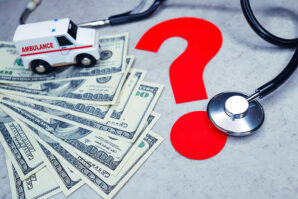 One of the most common reasons our clients file for bankruptcy is help with medical debt. A large, unexpected hospital bill can absolutely destroy the finances of most Dallas-area residents.
One of the most common reasons our clients file for bankruptcy is help with medical debt. A large, unexpected hospital bill can absolutely destroy the finances of most Dallas-area residents.
Out of control debt can be incredibly stressful – especially when bill collectors make aggressive collection calls at all hours of the day. Once the debt spirals out of control, it seems impossible to catch up.
Medical debt is one of the most common reasons for filing for bankruptcy. In a Chapter 7 bankruptcy case, the medical debt is eliminated. In a Chapter 13 bankruptcy, the debt is restructured into a payment plan that lasts several years.
Out of control debt can be terrifying, but there are options available for everyone. It is always best to speak with an experienced bankruptcy attorney, but we will explain as much as we can in this post to give you more insight before you call for your free consultation.
Can bankruptcy help with medical debt?
Yes! The U.S. bankruptcy laws were created to help give honest, hard working Americans a second chance. Bad things happen to good people, and the laws were designed to help people escape from unmanageable debt. Most people tend to think that people who file for bankruptcy are irresponsible or careless with their credit cards, but medical debt is often the leading cause for bankruptcy cases.
You may have heard the term “medical bankruptcy” thrown around. This is not an official legal term, but it’s how most people refer to bankruptcy cases that are driven by out of control medical debt – or debts that you simply cannot afford to pay.
What is medical debt?
Put simply: medical debt is a general term for unpaid medical bills. Any unexpected illness or injury can lead to medical bills, and those bills can quickly spiral out of control. Credit card bills and loans are actively chosen by people, but medical bills can happen out of the blue and accumulate quickly. With mounting bills and few options to pay them off, your overall financial picture can quickly deteriorate.
Making matters worse, medical insurance coverage is not universal. The amount of your medical bills that is covered can vary wildly, and one high-cost procedure might be all it takes to destroy your finances.
Many Americans have insurance plans with very low coverage, and many more are completely uninsured. Even simple emergency room visits can lead to astronomical medical bills. Any medical emergencies that lead to expensive procedures or long-term care will leave many families struggling to pay essential bills.
Which type of bankruptcy is the best for medical debt
There is no simple answer to this question. Every financial situation is unique, so if you are asking this question, the best answer is to call us at 214-760-7777 to schedule a free consultation. One of our experienced bankruptcy lawyers will talk to you about your situation, and once they’ve collected the details, they will explain your options so that you can make the best decision for your future.
In general terms, a Chapter 7 bankruptcy is designed to “discharge” or eliminate certain kinds of unsecured debts – and medical bills are included in this category. In a Chapter 13 bankruptcy, debts are restructured into a payment plan, giving you time to catch up on payments and start fresh. Our attorneys will explain how each works, along with explaining your eligibility based on income and assets.
Are there other options for medical debt besides bankruptcy?
Yes – bankruptcy isn’t the only answer. There are several non-profits that offer support services for people struggling with medical debt. There are a few government organizations who could also help, as well as local community programs and groups.
If your employer offers a Health Savings Account (HSA) or a Flexible Spending Account (FSA), either might help in the case of unexpected medical bills. Obviously, if you have already accumulated medical debt, these may not work for you, but there are tax benefits for enrolling in these programs and building up funds in the account. You should check with your employer about the options for HSAs or FSAs, since building funds in your account could guard against financial burdens from future medical debts.
Is bankruptcy the right choice for your medical debt?
Bankruptcy can definitely solve the problem of medical debt, but it may not be the right solution for everyone. Your first step should be consulting with an experienced bankruptcy lawyer. If you call us at 214-760-7777, one of our attorneys will gather your financial details and help determine eligibility for specific bankruptcy types. We will be able to outline all of the options available to you so that you can make the best decision for your future.
In some cases, you may have a higher income and while the medical debt is expensive, it may still be manageable – and you would not need to file for bankruptcy at all.
Call us today for a free medical debt consultation
Overwhelming debt can be stressful, regardless of the source of the debt. Our experienced Dallas bankruptcy attorneys can help you fully understand all of the options that you have available in your unique situation. We have helped countless DFW-area residents take back financial control and get a fresh start. Call us at 214-760-7777 to schedule your free consultation and take the first step towards a new tomorrow!
